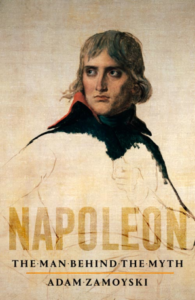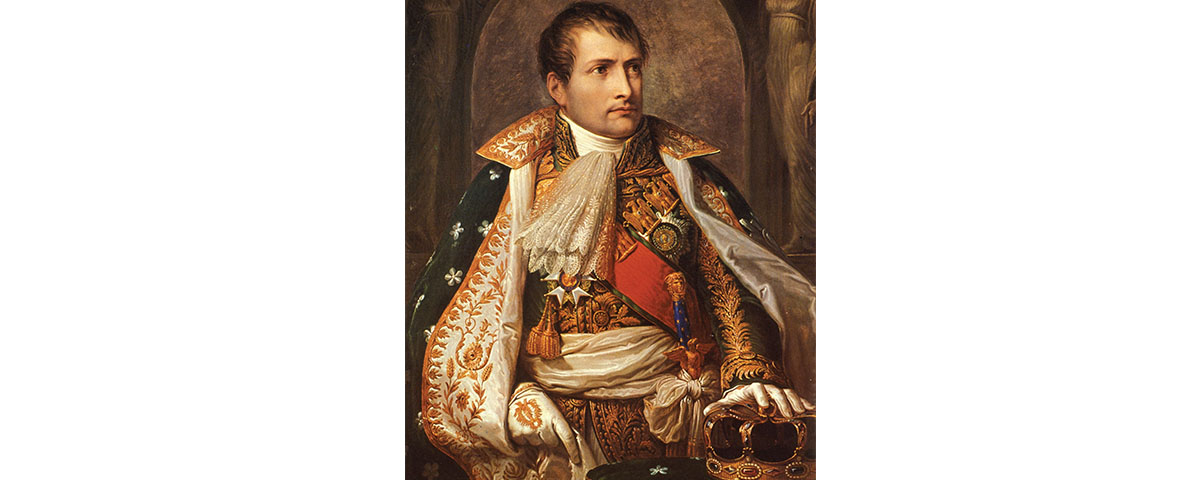“Opportunity often comes disguised in the form of misfortune, or temporary defeat,” Napoleon wrote. Not Napoleon Bonaparte; Napoleon Hill, the American self-help author who vaulted to fame in 1927 with The Law of Success. In Adam Zamoyski’s new biography Napoleon Bonaparte is the embodiment of Hill’s aphorism—a self-made man who seizes opportunity from misfortunes and setbacks. And despite his various grandiose titles—Emperor of the French, Protector of the Germans, King of the Italians, Mediator of the Swiss—ultimately, as the author shows, Napoleon was a mere human.
 For Napoleon, the beginning of the end came when he lost the ability to find opportunity in the misfortunes and defeats he suffered between 1812 and 1815. Zamoyski’s interpretation of Napoleon’s life may strike many readers as unusual. Although he avoids the hard psychoanalysis employed by historian Philip Dwyer in his mammoth two-volume biography of Napoleon, Zamoyski nevertheless argues that many of the great man’s successes and failures can be attributed to his insecurities. Another surprising aspect of the book is Zamoyski’s portrayal of the fragility of Napoleon’s rule. It’s remarkable, one may conclude, that his empire lasted as long as it did (from 1799 to 1815). Lastly, Zamoyski analyzes the many options facing Napoleon throughout the slow dissolution of his empire after the failed Russian campaign of 1812 and makes it clear that his personal foibles—not fate—caused it to end the way it did.
For Napoleon, the beginning of the end came when he lost the ability to find opportunity in the misfortunes and defeats he suffered between 1812 and 1815. Zamoyski’s interpretation of Napoleon’s life may strike many readers as unusual. Although he avoids the hard psychoanalysis employed by historian Philip Dwyer in his mammoth two-volume biography of Napoleon, Zamoyski nevertheless argues that many of the great man’s successes and failures can be attributed to his insecurities. Another surprising aspect of the book is Zamoyski’s portrayal of the fragility of Napoleon’s rule. It’s remarkable, one may conclude, that his empire lasted as long as it did (from 1799 to 1815). Lastly, Zamoyski analyzes the many options facing Napoleon throughout the slow dissolution of his empire after the failed Russian campaign of 1812 and makes it clear that his personal foibles—not fate—caused it to end the way it did.
Zamoyski, a British historian of Polish descent, deserves praise for his selection of sources. Unlike some recent works that rely on the accounts of contemporaries who abhorred Napoleon, Napoleon: A Life incorporates the voices of those who were both for and against him, and, even more important, those who were observers and not politically polarized.
Zamoyski displays his formidable talents as a writer in concisely explaining the complicated world of the French Revolution. Although his book fills more than 700 pages, it moves quickly, and Zamoyski adeptly avoids getting bogged down in any specific topic. Readers should not look to this book for a history of Napoleon’s military exploits or contributions to the art of war, as the military campaigns are oversimplified almost to a fault. And the book ends, abruptly, with Napoleon’s death on St. Helena in 1821; there is no analysis or mention of Napoleon in French memory. Nonetheless, Zamoyski’s book is one of the finest biographies of Napoleon Bonaparte ever written.
Michael V. Leggiere is professor of history and the deputy director of the Military History Center at the University of North Texas. He is the award-winning author of five books on the Napoleonic Wars.
[hr]
This article appears in the Autumn 2018 issue (Vol. 31, No. 1) of MHQ—The Quarterly Journal of Military History with the headline: Reviews | Reaching Verdicts


